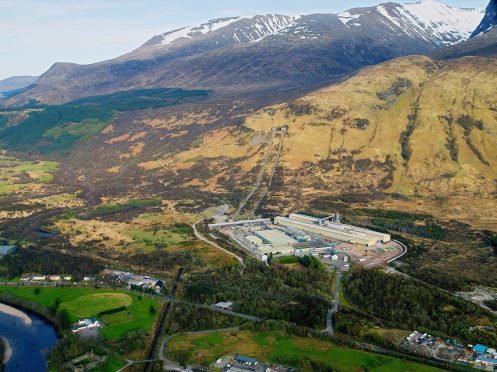The Highlands could soon be producing a quarter of all car wheels in the UK as a new industrial revolution accelerates in the region.
New details of Liberty British Aluminium’s vision for Fort William have revealed that the metals giant is aiming to produce up to two million alloy wheels every year at its proposed plant.
The ambitions plans were hailed last night as having the potential to trigger a “re-industrialisation of the Highlands” and turn the region into the centre of UK car component production.
Almost a year of uncertainty over the future of Fort William’s Alcan aluminium smelter was ended in November when it was announced that Liberty House and SIMEC would buy the assets previously owned by mining giant Rio Tinto.
The £330million deal secured the jobs of 170 workers, and in December the new owners said they would create 300 further direct jobs and 300 supply chain jobs by establishing a new car parts factory at the site.
Community consultations on a planning application for the venture will get under way in Lochaber in the next few weeks.
The firm has also signalled that “follow-up investments in other industrial operations in the area” will increase the number of new jobs to 1,000 directly employed and 1,000 indirect over the next decade.
Calculations seen by the Press and Journal have now revealed the dramatic impact the company aims to make in the market with its new Fort William car parts factory.
About 1.7million cars and 300,000 commercial vehicles were made in the UK last year, and most cars need four or five alloy wheels – making the total requirement in Britain to be between 6million and 8million wheels a year.
However, currently almost 100% of that demand is met by imports because there is no large-scale alloy wheel production in the country.
Liberty British Aluminium believes its new Fort William plant could displace 25% of these imports and supply the UK market with between 1.5million and 2million wheels each year.
The components factory will make the high-specification alloy wheels and other vehicle parts by processing aluminium from Fort William’s historic smelter, which is the last of its kind in the UK.
Sister firm SIMEC will supply hydro and bio-diesel power to the plant, as part of the company’s low-carbon “Greenmetal” strategy.
The new details of the vision emerged after local MP Ian Blackford and MSP Kate Forbes received a tour of the plant by bosses last week.
Last night, Mr Blackford said: “When you look at the vision that Liberty and its management have, there is no doubt in my mind that what they are doing is good for Lochaber and the Highlands.
“Plans for the new Liberty industrial facilities in Lochaber are proceeding rapidly, with the real prospect of re-industrialisation of the Highlands bringing very much-needed jobs and an economic boost.”
A new Lochaber Delivery Group has been established to discuss ways to prepare the region for the influx of workers, while NHS Highland chiefs aim to progress plans for a £20million replacement of the town’s Belford Hospital.
Mr Blackford, MP for Ross, Skye and Lochaber, said: “With this number of jobs we must take a real look at infrastructure and what will be needed, not least in providing new homes for the many people who will work here.
“This has to start now. We must work with Liberty to keep pace with what they are doing and ensure that a workforce can be accommodated where and when it is needed.”
Ms Forbes said: “I am excited about Liberty’s plans for the smelter because it could make the Highlands the centre for production of car components.
“The potential for jobs is enormous and I hope the benefits of increased economic activity will spread throughout Lochaber communities.
“I’m pleased that Liberty have not just talked about plans, they’re already actively turning their plans into reality. The faster that Liberty gets started, the quicker we’ll see the benefits.”
Brian King, managing director Lochaber operations for Liberty and SIMEC, said: “We are hugely encouraged by the interest and support shown by Kate and Ian. This spirit of partnership is exactly what we need in order to make this venture a big success for the local and regional economy.”
Comment, Page 25
